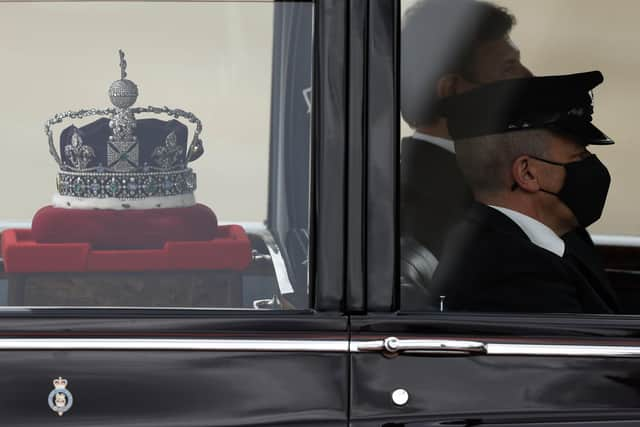Queen’s speech promises to 'strengthen economic ties across the union' and invest in Scotland
Marking the beginning of the parliamentary session, the Queen outlined the UK Government’s legislative plans in a stripped-down ceremony due to the pandemic.
Speaking on Tuesday morning, the head of state claimed Boris Johnson’s government would act in the interests of the Union.
Advertisement
Hide AdAdvertisement
Hide AdShe said: “My government will strengthen the economic ties across the union, investing in and improving national infrastructure.


“My ministers will promote the strength and integrity of the union. Measures will be brought forward to strengthen devolved government in Northern Ireland and to address the legacy of the past.”
The UK Government also reiterated its commitment to the Union in a policy document, saying it would build on “hundreds of years of partnership between the regions of our country as the most successful political and economic union in history, the foundation upon which all our businesses and citizens are able to thrive and prosper”.
The document also hinted against holding another independence referendum soon, saying the health crisis was a shared challenge and “our collective priority right now should be tackling them together”.
Despite promising a flurry of investment, the speech was light on details of new investment for Scotland.
It comes with the Prime Minister set to make a series of investment suggestions at a summit with Nicola Sturgeon and the leaders of the other devolved administrations in coming weeks.
The speech also outlined plans for a potential “vaccine booster campaign” later this year.
This would see the UK Government work with vaccine suppliers to work out which vaccines could be effective as a booster shot of a Covid-19 vaccine, and to design new vaccines specifically targeted at variants of concern.
Advertisement
Hide AdAdvertisement
Hide AdIt also suggested that regular boosters were “likely” to become a regular part of managing Covid-19.
Plans were also outlined for a Judicial Review Bill to “protect the judiciary from being drawn into political questions”.
It follows the Prime Minister’s deeply controversial proroguing of Parliament, but could have implications if another referendum faced a legal challenge.
Other announcements included establishing an advanced research agency, eight new freeports to create hubs for trade, and proposals to transform connections by rail and bus.
It also claimed “Scottish businesses will flourish outside the EU” by finding new markets.
As part of the Lifetime Skills Guarantee £2.5 billion National Skills Fund, the devolved administrations would receive £500 million through Barnett consequentials as skills is devolved.
New measures to counter hostile activity by foreign stages were included, along with better protections for children online and measures to end gay conversion therapy.
Despite having promised to fix social care when first elected in 2019, and it being in the Tory manifesto in 2015, Mr Johnson failed to address the problem.
Advertisement
Hide AdAdvertisement
Hide AdSpeaking ahead of the speech, the Prime Minister claimed people across the UK wanted a “new approach”.
He said: “We must harness the ingenuity and resolve that has been revealed in the struggle against Covid-19, and use it to create a stronger, healthier and more prosperous nation.
"We have been given an historic opportunity to change things for the better, level up opportunities across the whole of the United Kingdom and address the problems that have constrained us far too often before.”
The plans also included controversial plans requiring voters to show photo ID at Westminster elections.
Health secretary Matt Hancock earlier claimed the issue was to protect the “integrity of election”, despite just one conviction for voter fraud in the 2019 election.
SNP Westminster depute leader Kirsten Oswald MP claimed the policy amounted to “voter suppression”.
She said: “Boris Johnson's Trump-like plans to disenfranchise thousands of voters across Scotland and the UK are an act of blatant Tory voter suppression – and must be stopped.
"There is a very real danger that many lower income, ethnic minority, and younger people will be prevented from voting to fix a problem that doesn't exist. These laws are designed to suppress votes among groups that traditionally vote against the Tories. It's a disgrace.
Advertisement
Hide AdAdvertisement
Hide Ad"The SNP is clear – we will reject any such measures for Scottish elections.
"Instead of suppressing votes, the SNP Government is focused on extending the franchise and encouraging higher turnout, including by introducing votes for 16 and 17-year-olds, refugees and foreign nationals with leave to remain.”
Labour leader Sir Keir Starmer also criticised the speech, saying the country needed “action”.
He said: "We must see detail on long-promised plans to fix the broken social care system, reduce the shocking levels of violent crime and narrow the gap between different parts of the country.
"For 11 years we have had lots of rhetoric and the endless promise of jam tomorrow.”
Liberal Democrat leader Sir Ed Davey labelled the Queen's Speech as "disturbing", claiming it could "undermine people's right to vote".
He said: "Liberal Democrats were looking for a programme that would deliver a fairer, greener and more caring country after Covid, and I am afraid today we didn't get one.”
Plans to toughen up the UK’s asylum system were also been condemned by the United Nations, campaign groups and opposition MPs.
Advertisement
Hide AdAdvertisement
Hide AdFor the first time the way people entered the UK – either through legal or irregular means – will have an impact on how their claim progresses.
Mr Johnson claimed the plans would “help crack down on the criminal gangs” behind “illegal entry into the UK”.
The UN’s refugee agency has demanded a rethink, while Enver Solomon, chief executive of the Refugee Council, condemned the proposals as “cruel and unfair".
If you haven't already, please consider supporting our trusted, fact-checked journalism by taking out a digital subscription.
Comments
Want to join the conversation? Please or to comment on this article.
